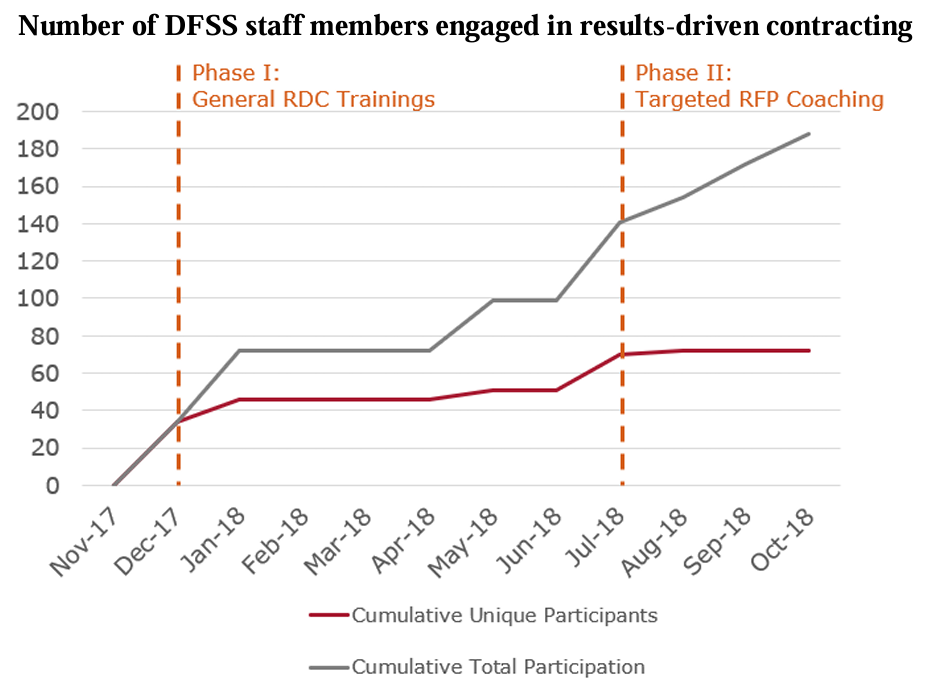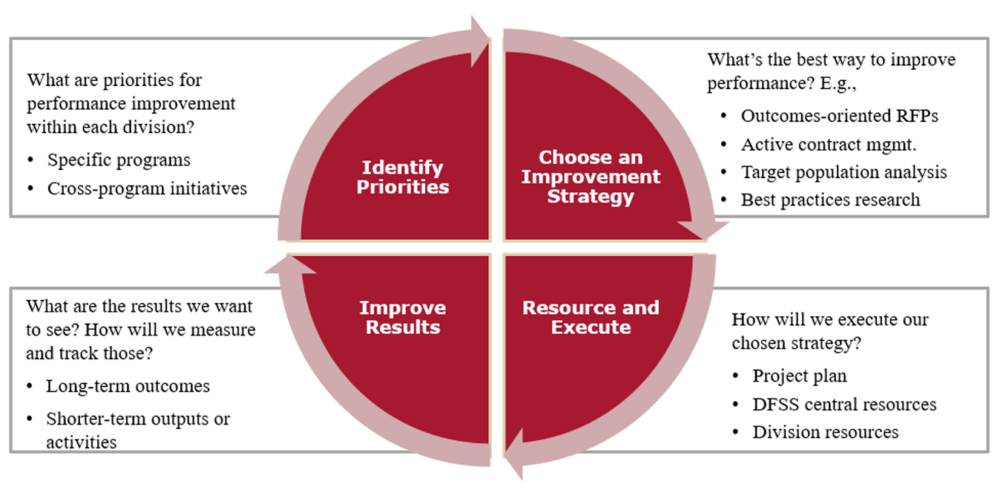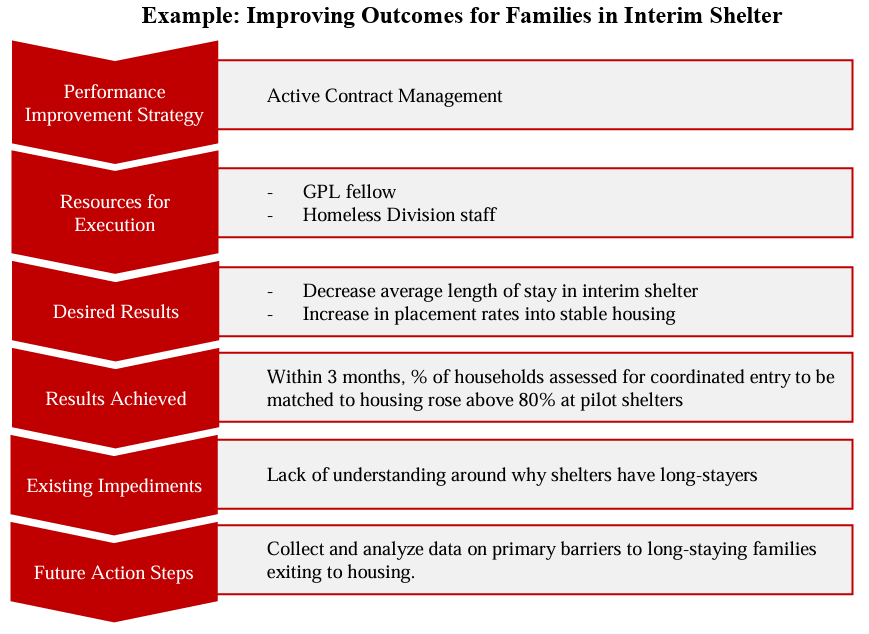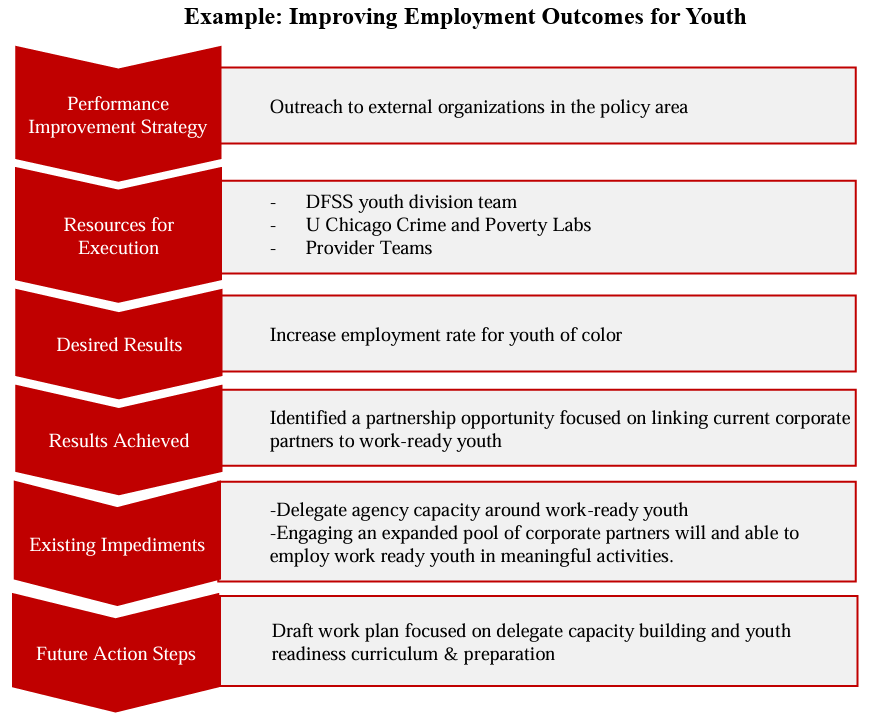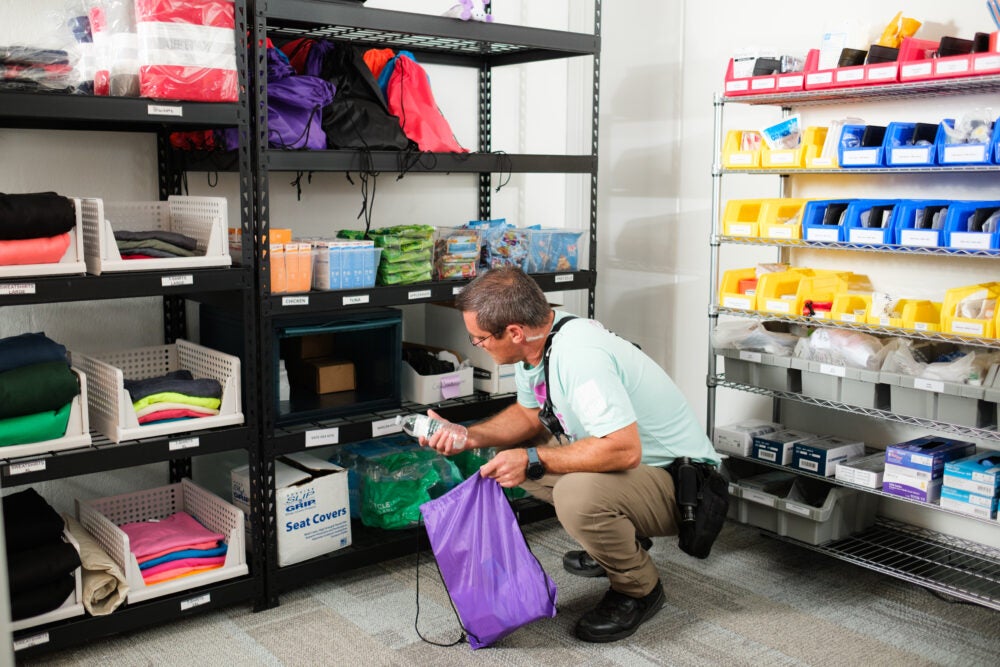
Strengthening Alternative 911 Emergency Response
The Chicago Department of Family and Support Services (DFSS) is the city’s largest human and social services funder, distributing about $330 million dollars annually to delegate agencies that provide services to children and youth, seniors, job-seekers with significant barriers to employment, victims of domestic violence, and individuals experiencing homelessness. In an effort to better support the vulnerable Chicagoans who were accessing its programs, DFSS adopted a strategic commitment to outcomes-focused programs in 2016, creating a shared mission, establishing department priorities, setting divisional goals, and creating new key leadership positions such as a Director of Strategic Planning and Impact. In order to translate a commitment to outcomes into actual changes for service users, DFSS needed to address two key challenges
First, since the large majority of DFSS’s annual budget goes to fund non-profit service providers, contracting and grants management needed to be focused on achieving the department’s strategic priorities around improving the lives of the individuals it serves. Under the existing system, requests for proposals (RFPs) were treated as a back-office, administrative function, leading to funding decisions and contract management practices that emphasized compliance over performance. The approach to RFPs was uninspired, with staff often copying and pasting from previous RFPs, and DFSS wasn’t sure whether it was reaching all providers capable of delivering services. Once contracts were awarded, there was little coordination or communication with service providers around performance improvement or achieving key outcome goals, and there were limited mechanisms for holding providers accountable to these goals.
Second, DFSS’s core operations and day-to-day business practices needed to be organized around achieving the outcome goals each division had laid out. Like many government agencies, DFSS staff spent their time and energy getting dollars out the door quickly and reacting to the most pressing problems of the day, such as setting up emergency warming centers during bouts of extreme cold or responding to urgent requests from the Mayor’s office. While being responsive to emergent issues is a necessary and important part of the work DFSS does, the department struggled to make space beyond these activities to strategically improve program performance.
With support from the GPL, DFSS overhauled its contracting and grants management processes and developed a new performance improvement system in order to drive better outcomes in its contracted services. As a result, $270 million dollars of DFSS funding has been re-bid using results-driven contracting strategies, the department is receiving more and higher quality responses to RFPs, and each DFSS division is actively working towards improving key outcome goals using the new system of performance improvement.
With the GPL’s support, DFSS overhauled its contracting and grants management strategies in order to translate its broad commitment to achieving better outcomes for vulnerable Chicagoans into action. As part of this, the GPL and DFSS:
Taking advantage of a large grant cycle in Spring 2018, DFSS released 26 RFPs that focused on communicating the ultimate client-level goals of DFSS programming and how service provider progress against these goals would be measured. The department leveraged the opportunity that these 26 RFPs presented in order to change many department-wide contracting policies and practices to ensure that all DFSS RFPs going forward would reflect a results-driven approach. Since this initial overhaul, 11 additional RFPs have been released using this approach. In order to support the transition to results-driven RFPs, the GPL and DFSS implemented a two-pronged strategy by 1) creating new contracting structures and processes, and 2) facilitating training and providing comprehensive guidance to department staff.
New contracting structures and process DFSS developed a new, centralized RFP process to establish clear expectations and accountability among the different divisions involved in an RFP. This new process also includes more time in the RFP development phase for program staff to thoughtfully craft each solicitation. Biweekly “Strategic Contracting” meetings for DFSS leadership were implemented to shepherd upcoming and in-progress RFPs across program and administrative divisions, elevate priority RFPs for additional support, and address systemic barriers to successful contracting efforts. In addition, a new staff position has been created under the Director of Strategic Planning and Impact with the aim of centrally resourcing ongoing coaching for priority RFPs and providing additional support to ensure the contracting process continues to be used as a strategic tool to improve outcomes.
Newly released RFPs contain goals that are more outcomes-oriented and measurable. Previously, the department’s RFPs emphasized required activities, and only broadly defined program goals, if at all. Now, the department’s RFPs each include a discussion of the end results the department is trying to achieve, with focused, actionable, and attainable goals spelled out. See below for an example of how the stated goals changed in an employment placement RFP.
Previous RFP: The goal of the program is to provide employment preparation and placement services tailored to the needs of multiple barrier populations… DFSS expects the Employment Preparation and Placement site to develop individualized career plans with participants that will lead individuals on a career path out of poverty.
2018 RFP: The goal of the Employment Preparation and Placement program is to provide high-need individuals with the necessary job readiness training and placement supports to obtain and sustain employment with wages at or above the Standard City Minimum Wage.
The new RFPs also contain more detailed information about target populations, explicitly identifying the intended recipients of each service and providing information about their needs. Previously, RFPs often provided very broad definitions of target populations with little information on the population’s needs. Now, target populations are clearly defined using eligibility parameters and local statistics. The RFPs also describe specific challenges faced by identified populations. See below for an example of how a senior services RFP evolved to more accurately identify the intended target population and their needs.
Previous RFP: The Intensive Case Advocacy and Support (ICAS) for At-Risk Seniors program provides in-home assessment, case advocacy and support, on-going monitoring, and direct assistance for at-risk seniors.
2018 RFP: According to the 2016 American Community Survey, approximately 48% of the 437,818 seniors ages 60 and above in Chicago are living alone, including 39,491 ages 85 and above. The majority of older adults live independently without assistance. However, some face neglect by others, or lack the capacity to maintain their own safety due to physical or mental health issues – many fall into a state of self-neglect. ICAS targets highly vulnerable older adults (particularly ages 85 and above) who are often in greatest social and economic need, living alone in a state of self-neglect, at risk to themselves or others, or who lack capacity to manage their own care and safety.
Comprehensive training and guidance
In order to ensure uptake of the new results-driven process and framework by both department staff and providers, DFSS provided comprehensive training and guidance for the new system. More than 70 DFSS department staff were trained in results-driven contracting (RDC) strategies, with many of these staff members participating in multiple different trainings (see figure below). In addition, the department’s RFP template was redesigned to guide providers to elevate outcome goals, articulate a clear problem statement, define a target population, and communicate performance metrics in order to advance strategic priorities and encourage innovation.
New tools were also produced to guide RFP development, funding decisions, and contract scope development. For example, guiding questions for early RFP planning include prompts for divisional staff to focus on setting goals and identifying what needs to change, understanding potential solutions to address goals and needs, and involving the community and other relevant stakeholders in the planning process. Other available tools include mini-trainings for each phase of contract development, and templates for scoring and evaluating RFP proposals.
DFSS, with the GPL’s support, designed and implemented a system to help the department’s seven programmatic divisions advance work that is particularly impactful for making progress toward their division outcome goals. The new performance improvement system emphasizes identifying priorities, choosing an improvement strategy, deciding how to resource and execute improvements, and then following up to drive improved results. A snapshot of this system is shown below:
As part of the performance improvement system’s rollout, a new tool was designed to enable each division to document and track its performance improvement initiatives. This tool includes a space to communicate what strategy is being used to improve performance for each initiative, for example: research from best practice, a target population analysis, results-driven contracting, or more active contract management. Project partners also modified the department’s monthly report template to prompt DFSS executive team leaders to review each division’s performance improvement initiatives during monthly check-ins with division leaders.
The goal of the new performance management system is to allow program staff to more effectively communicate their priorities, elevate impediments promptly so they can be addressed, request resources in a way that shows commitments to results, and demonstrate progress towards important program outcomes. For example, the Homeless Services Division of DFSS identified decreasing length of stays in interim shelters and increasing placement rates into stable housing as a major divisional priority. The division identified active contract management—a practice of working collaboratively with providers through the course of their contracts to review key performance data, generate insights on drivers of performance, and test possible solutions—as the appropriate 4 performance improvement strategy, and began execution with a pilot of five shelters. Within three months, the percentage of households at pilot shelters assessed for coordinated entry (which must be done in order to be matched to stable housing) rose above 80% for the first time. The division has now resourced this strategy to engage all interim shelters serving families in working towards their goal of increasing placement rates into stable housing, and is currently exploring drivers of long-term interim shelter stays in order to most effectively address this issue.
The performance system framework is also helping divisions tackle long-standing challenges that have been difficult to address. For example, although the DFSS Youth Services Division operates one of the largest youth-focused summer employment programs in the country (One Summer Chicago), demand for summer employment each year has outpaced the program’s available subsidized employment slots, even as the number of slots has grown. In response, the division enacted a performance improvement plan that leverages new and existing relationships with local corporate partners to prepare and link work-ready youth with unsubsidized employment opportunities to drive improvements in the youth employment rate outside the slots available through the One Summer Chicago program.
1. Re-bidding $270 million dollars of DFSS funding using results-driven contracting
DFSS has implemented results-driven RFPs for the majority of its work, including 73% of its program models and representing over 80% of DFSS’s dollars going out the door to service providers. This ensures the department and its service providers have a common understanding of the most important client outcomes for its programs and can work together to achieve a shared vision of success. These strategies have been used across all seven of the department’s programmatic divisions to support a wide range of Chicagoans accessing services. Examples of new results-driven RFPs include employment preparation and placement programs, permanent supportive housing, counseling services for victims of domestic violence, early childhood education programs, support programs for vulnerable older adults, and youth mentoring services.
While there are now explicit differences in how DFSS staff write RFPs, there are also key differences in how staff think about RFPs. While previously program staff did not view themselves as the primary authors or owners of RFPs, now they understand RFPs to be one of the tools they can use to improve program performance. This new approach to contracting and grants management has ensured that staff direct funds more strategically to directly support progress towards the department’s key goals.
2. DFSS is receiving more and higher-quality responses to RFPs for a range of social services
When DFSS surveyed service providers who responded to the 26 results-driven RFPs released in 2018, almost 90% indicated that the new RFPs allowed them to submit better proposals that demonstrate their ability to achieve the department’s desired results. They indicated that these RFPs provided a clear understanding of the problem each program is trying to address, as well as the outcome goals and target populations for each program. See below for examples of feedback from a few of the surveyed providers.
“I really appreciated the set-up of the RFP. I think the content was very clear and logical, setting clear expectations, prompting thoughtful questions, and establishing clear criteria of success.”
“I like that DFSS is moving away from the one size- /one set of measurements- fits all approach. I hope this continues. I particularly like the ability to suggest measurements that were specific to our program.”
“We were able, because of the additional questions and requests, to better tailor our responses and state our qualifications for those specific programs.”
“I appreciated the streamlined process provided through this RFP, as well as the tools made available to grantees, which were well-communicated.”
As the quality of RFP responses has risen, so too has the number of respondents. The number of responses to the RFPs released in Spring 2018 increased by 7% over the previous round, allowing the department to make more informed funding decisions to improve results for Chicagoans.
3. DFSS has elevated and resourced 34 priorities across all 11 program and administrative divisions in order to make progress toward key divisional outcome goals
DFSS has implemented the new performance improvement system for all of its program and administrative divisions. Each division has elevated between three and five items as priorities for reaching their outcome goals, and is implementing performance improvement strategies for each. The new performance improvement system is helping DFSS divisions identify, resource, and make progress towards their key priorities. As a result of this work, DFSS senior leadership are able to look across the portfolios of division work in order to make decisions about where to contribute centralized resources and which common challenges need to be addressed.
This project has enabled DFSS to transform its commitment to outcomes-focused programs into tangible action by purposefully and strategically connecting spending on social services to improved client outcomes. With the GPL’s help, DFSS strategically re-bid over 80% of its budget for contracted services to drive improvements in outcomes for Chicago’s children and youth, seniors, job-seekers with significant barriers to employment, victims of domestic violence, and individuals experiencing homelessness.
—
The Government Performance Lab is grateful for support from Bloomberg Philanthropies, the Corporation for National and Community Service Social Innovation Fund, the Dunham Fund, the Laura and John Arnold Foundation, the Pritzker Children’s Initiative, and the Rockefeller Foundation.
Strengthening Alternative 911 Emergency Response
Strengthening Alternative 911 Emergency Response
Strengthening Alternative 911 Emergency Response
Strengthening Alternative 911 Emergency Response
Strengthening Alternative 911 Emergency Response
Strengthening Alternative 911 Emergency Response



